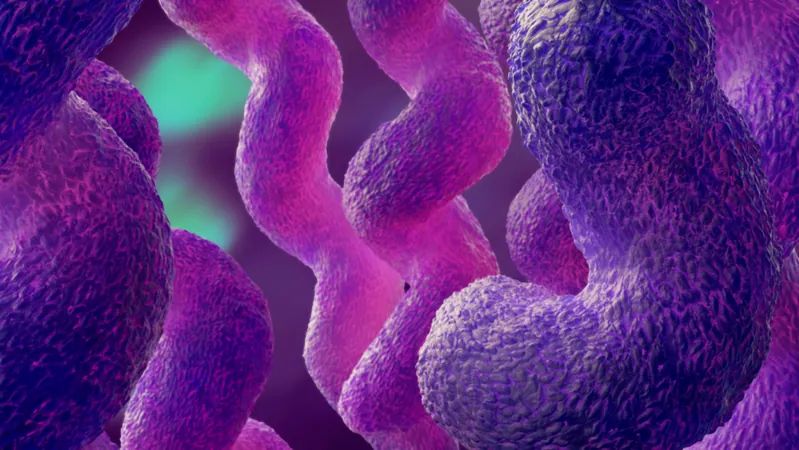
Shocking Discovery: Common Bacterial Toxin Linked to Faster Spread of Colorectal Cancer!
2024-12-09
Author: Nur
Recent groundbreaking research has revealed that a common bacterial toxin may significantly accelerate the metastasis of colorectal cancer to other parts of the body, potentially transforming how we detect and treat this deadly disease. The study, conducted by researchers led by Dr. Christian Jobin and published in the journal *Cell Host & Microbiome*, suggests that early intervention could save countless lives.
Why You Should Care About Colorectal Cancer
Colorectal cancer is the second leading cause of cancer-related deaths in the United States. Alarmingly, when detected at an early stage, patients boast a remarkable 90% five-year relative survival rate. However, this percentage drastically decreases when cancer spreads, making metastasis the primary culprit behind cancer mortality. Available treatment options for patients with advanced colorectal cancer are often limited, emphasizing the urgent need for pioneering approaches in detection and therapy.
Unveiling the Enemy: The Role of Microbiota
The human intestinal microbiota, a diverse community of microorganisms, plays a crucial role in maintaining health. Recent studies suggest they may also influence cancer development and progression, particularly colorectal cancer. One notorious player in this arena is *Campylobacter jejuni*, a bacteria responsible for more than 2 million foodborne illness cases in the U.S. each year. Certain strains of this bacterium produce a toxin known as cytolethal distending toxin (CDT), which prior research indicated could contribute to colorectal cancer progression in animal models.
The Study: Insights and Revelations
In the latest study, scientists meticulously examined tissue samples from 71 patients with primary colorectal cancer—34 of whom developed metastasis within three years, while 37 did not. A startling discovery was made: participants who exhibited higher levels of *C. jejuni* had significantly poorer prognoses.
Dr. Jobin explained, "These findings confirmed that CDT is essential for the bacteria's role in promoting cancer spread. When bacteria that produce CDT move to tumors outside the gut, it appears to accelerate the spread of these tumors."
Expanding on their research, the team used models involving laboratory mice with metastasizing lung and liver tumors, as well as human colorectal cancer tissue. They revealed that the CDT toxin enhanced the activity of various enzymes and triggered signaling pathways in cancer cells that promote metastasis.
Implications for Future Cancer Treatments
This timely research is a beacon of hope, paving the way for innovative preventative measures and treatment strategies. Currently, several clinical trials are underway, exploring drugs that disrupt the cell signaling pathways influenced by CDT. If successful, these breakthroughs could lead to targeted therapies that specifically address how bacterial toxins contribute to tumor spread.
Dr. Jobin concluded with optimism, stating, "This work enhances our understanding of how bacterial toxins promote colorectal metastasis, potentially leading to novel screening methods to identify at-risk patients."
What Lies Ahead?
The study also found live bacteria in tumors outside the gastrointestinal tract, suggesting that such tumors create a conducive environment for bacterial growth. These observations underscore the need for further research into the migration mechanisms of these bacteria and their influence on cancer progression.
Stay tuned for updates on this emerging research! Could antibiotics or microbiome modulation become vital tools in the fight against colorectal cancer? The answers may reshape our understanding of cancer treatment as we know it!




 Brasil (PT)
Brasil (PT)
 Canada (EN)
Canada (EN)
 Chile (ES)
Chile (ES)
 España (ES)
España (ES)
 France (FR)
France (FR)
 Hong Kong (EN)
Hong Kong (EN)
 Italia (IT)
Italia (IT)
 日本 (JA)
日本 (JA)
 Magyarország (HU)
Magyarország (HU)
 Norge (NO)
Norge (NO)
 Polska (PL)
Polska (PL)
 Schweiz (DE)
Schweiz (DE)
 Singapore (EN)
Singapore (EN)
 Sverige (SV)
Sverige (SV)
 Suomi (FI)
Suomi (FI)
 Türkiye (TR)
Türkiye (TR)